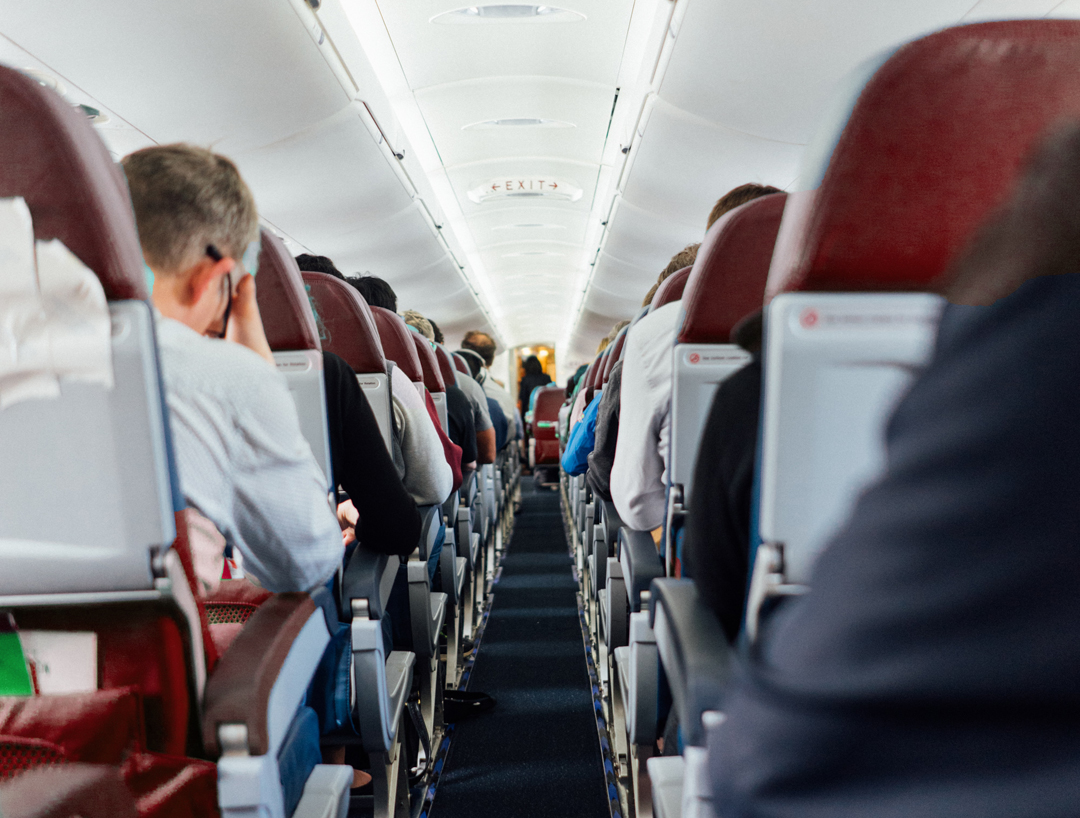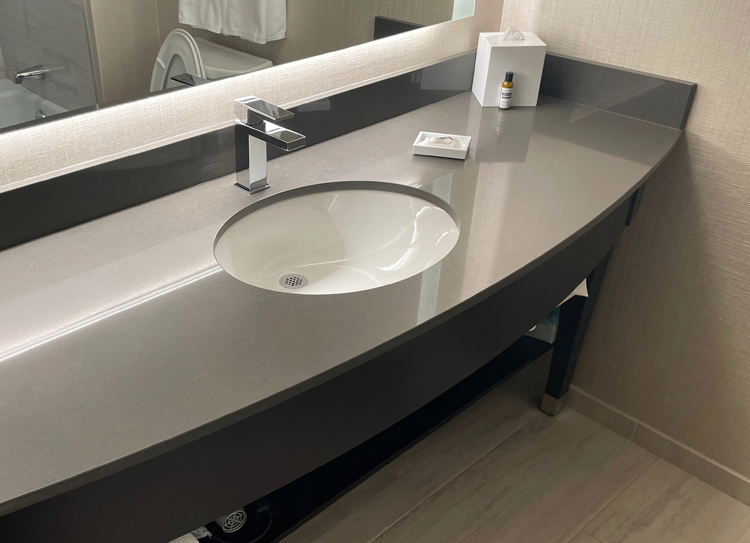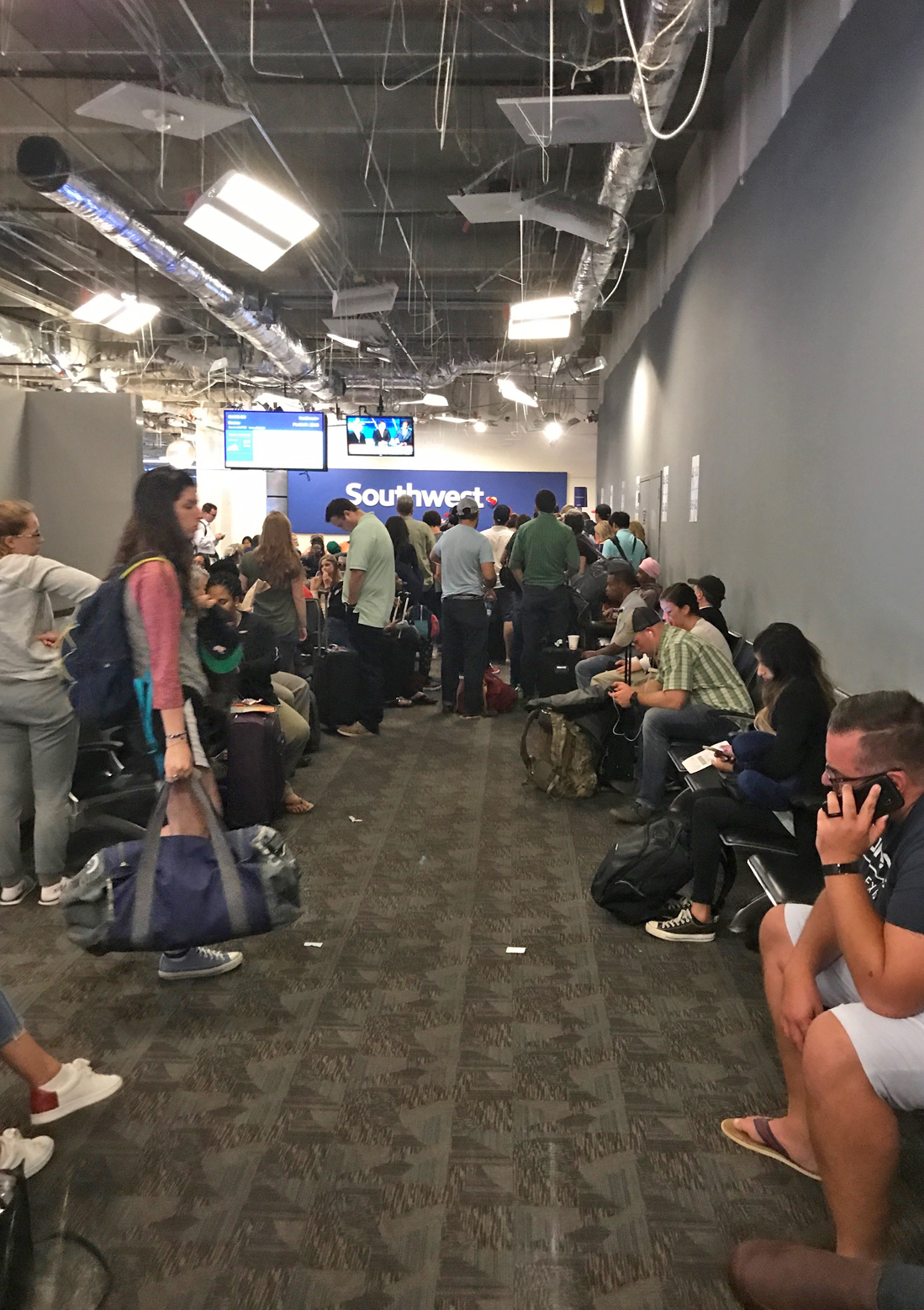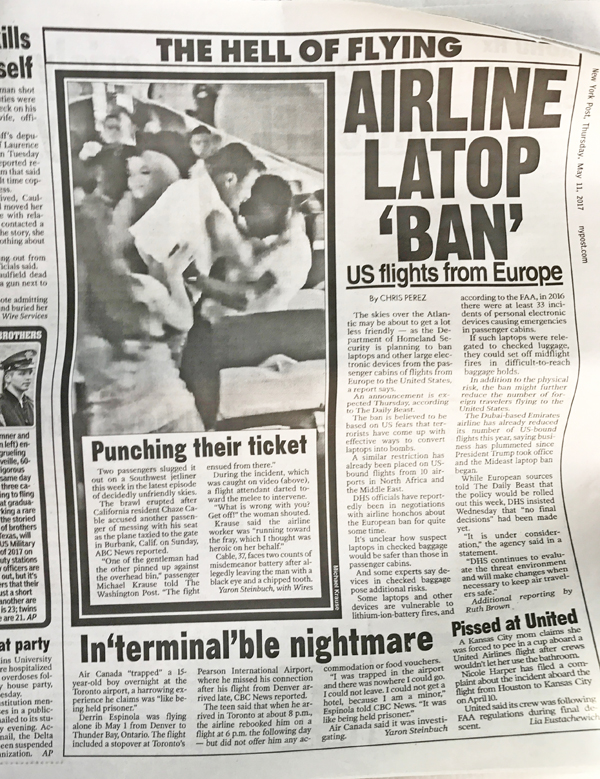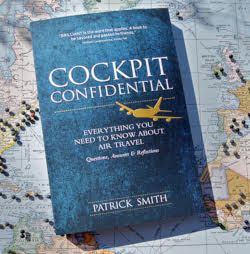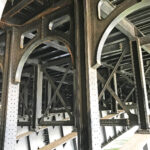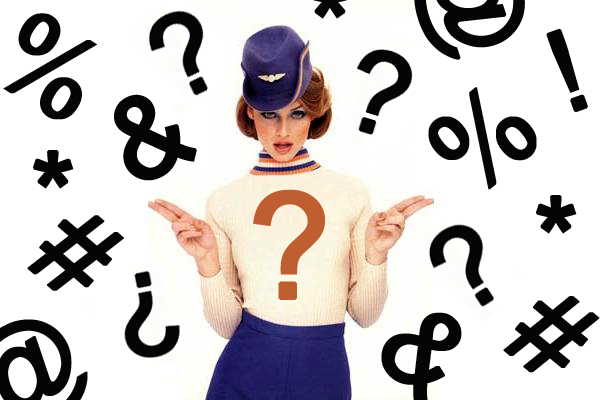
Crosscheck? Ramp? Ground stop? Who comes up with these things? Finally, a code to the insufferable jargon of air travel.
THE EXPERIENCE OF AIR TRAVEL IS UNIQUE in that people subject themselves to a long string of mostly anonymous authorities. From the moment you step through the terminal doors, you’re hit with orders — stand here, take your shoes off there, put your seat belt on, do this, put away that — and a flurry of information. Most of it comes not face-to-face, but over a microphone, delivered by employees, seen and unseen, in a tautologically twisted vernacular that binges on jargon, acronyms, and confusing euphemisms.
The ways in which airline workers can bend, twist, and otherwise convolute the English language is nothing if not astonishing. For reasons unknown, it is impossible for a crew member to simply say, for instance: “I am driving my car to work.” Instead, he or she must say, “At this time, I am operating my vehicle to my location of employment.” This stylistic overkill is designed, I think, to get your attention, and to make a particular statement sound extra-important. All it actually does, though, is burden your synapses by forcing them to deal with far more words than they need to. The phrasing is often so strained and heavy-handed that you can almost hear the sentences crying out in pain.
There are people who make dozens of air journeys annually and still have only a vague understanding of many terms. To help, I’ve compiled a glossary, focusing on those expressions most easily misunderstood, or not understood at all. In no special order:
• DOORS TO ARRIVAL AND CROSSCHECK
Meaning: Occasionally heard as “disarm your doors and crosscheck,” and announced by the lead flight attendant or purser as a plane approaches the gate. The intent is to verify disarming of the emergency escape slides attached to the doors. When armed, a slide will automatically deploy the instant its door is opened. Disarmed, it needs to be deployed manually. On departure the slides are armed to facilitate an emergency evacuation. (You might hear this as “doors to automatic.”) Upon docking, they’re disarmed to keep them from billowing into the boarding tunnel or onto the apron during servicing.
Crosscheck is a generic term used by pilots and flight attendants meaning that one person has verified the task of another. In the cabin, flight attendants crosscheck one another’s stations to make sure the doors are armed or disarmed as necessary.
• ALL-CALL “Flight attendants, doors to arrival, crosscheck and all-call.”
Meaning: Often part of the arming/disarming procedure, this is a request that each flight attendant report via intercom from his or her station — a sort of flight attendant conference call.
• LAST MINUTE PAPERWORK “We’re just finishing up some last minute paperwork and should be underway shortly…”
Meaning: Everything is buttoned up and the flight is ready for pushback. Then comes the wait for “last minute paperwork,” which winds up taking half an hour. Usually it’s something to do with the weight-and-balance record, a revision to the flight plan, or waiting for the maintenance guys to deal with a write-up and get the logbook in order.
• FLIGHT DECK
Meaning: The cockpit.
• FIRST OFFICER (also, COPILOT)
Meaning: Second in command on the FLIGHT DECK. The first officer sits on the right and wears three stripes. He or she is fully qualified to operate the aircraft in all stages of flight, including takeoffs and landings, and does so in alternating turns with the captain.
• FLIGHT LEVEL “We’ve now reached our cruising altitude of flight level three-three-zero. I’ll go ahead and turn off the seat belt sign…”
Meaning: There’s a technical definition of flight level, but I’m not going to bore you with it. Basically this is a fancy way of telling you how many thousands of feet you are above sea level. Just add a couple of zeroes. Flight level three-three zero is 33,000 feet.
• HOLDING PATTERN
Meaning: A racetrack-shaped course flown during weather or traffic delays. Published holding patterns are depicted on aeronautical charts, but one can be improvised almost anywhere.
• GROUND STOP “Sorry folks, but there’s a ground stop on all flights headed south from here.”
Meaning: The point when departures to one or more destination are curtailed by ATC, usually due to a traffic backlog.
• EFC TIME “Good news, we’ve been given an EFC time of 30 minutes after the hour.”
Meaning: The expect further clearance (EFC) time, sometimes called a release time, is the point at which a crew expects to be set free from a HOLDING PATTERN or exempted from a GROUND STOP.
• WHEELS-UP TIME
Meaning: Similar to the EFC TIME, except it refers to the point when a ground-stopped plane is expected to be fully airborne. The crew and ground team must be sure to get the flight boarded and pushed in order to be at or near the runway as close to this time as possible.
• AREA OF WEATHER “Due to an area of weather over New Jersey, we’ll be turning southbound toward Philadelphia…”
Meaning: This typically means thunderstorms or a zone of heavy precipitation.
• AIR POCKET
Meaning: This is merely colloquial for a transient jolt of turbulence; there is no formal meteorological definition.
• FINAL APPROACH “Ladies and gentlemen, we are now on our final approach into Miami.”
Meaning: For pilots, an airplane is on final approach when it has reached the last, straight-in segment of the landing pattern — that is, aligned with the extended centerline of the runway, requiring no additional turns or maneuvering. Flight attendants speak of final approach on their own more general terms, in reference to the latter portion of the descent.
• THE FULL, UPRIGHT AND LOCKED POSITION
Meaning: Upright.
• TAMPERING WITH, DISABLING, OR DESTROYING “Federal law prohibits tampering with, disabling, or destroying a lavatory smoke detector.”
Meaning: Tampering with.
• THE OFF POSITION
Meaning: Off.
• FLOOR AREA “Please check the floor area for any personal items before deplaning.”
Meaning: The floor. This is a common one from the flight attendants as part of their after-landing spiel. I mean, who talks like this? When you’re at home, do you say, “I need to vacuum the floor area”? Or, “Look at that, Brendan, you’ve spilled cereal all over the floor area!”
• DEPLANE
Meaning: Deplane is used to describe the opposite of boarding an aircraft. There are those who feel the root “plane” should not be used as a verb, fearing a chain-reaction of abominable copycats. Imagine “decar” for getting out of your car, or “debed” for waking up. In fact, dictionaries date “deplane” to the 1920s, and while it’s not the slickest sounding word, it’s a term of occasional convenience. There aren’t any PA-friendly options with the same useful meaning. “Disembark” is the most elegant one, and it’s clumsy.
• DEADHEAD
Meaning: A deadheading pilot or flight attendant is one repositioning as part of an on-duty assignment. This is not the same as commuting to work or engaging in personal travel.
• EQUIPMENT “Due to an equipment change, departure for Heathrow is delayed three hours.”
Meaning: An airplane. You might also hear a pilot ask of another pilot, “What equipment are you on?” What he means is, “What kind of plane do you fly?” Yes, I agree, there is something decidedly strange about the refusal to call the focal object of the entire industry by its actual name?
• DIRECT FLIGHT
Meaning: Technically, a direct flight is a routing along which the flight number does not change; it has nothing to do with whether the plane stops. This is a carryover from the days when flights between major cities routinely made intermediate stops, sometimes several of them. Most airline staff are smart enough to realize that if a passenger asks if a flight is “direct,” he or she wants to know if it stops, but check the fine print when booking.
• NONSTOP
Meaning: That’s the one that doesn’t stop.
• GATEHOUSE “If there is a passenger Patrick Smith in the gatehouse, please approach the podium?”
Meaning: An idiosyncratic way of saying the gate area or boarding lounge. Gatehouse has a folksy touch that I really like. They should use it more often.
• PRE-BOARD “We would now like to pre-board those passengers requiring special assistance.”
Meaning: This one, on the other hand, has no charm. It means to board. Except, to board first.
• FINAL AND IMMEDIATE BOARDING CALL
Meaning: A flamboyant way of telling slow-moving passengers to get their asses in gear. It provides more urgency than just “final call” or “last call.”
• TICKETED AND CONFIRMED PASSENGERS “We invite all ticketed and confirmed passengers to board through the gate marked five.”
Meaning: Passengers. As if, by not specifying “ticketed and confirmed,” random ticketless people might wander onto the plane.
• MARKED “…the gate marked five.”
Meaning: As opposed to the gates that have no numbers. Of which, of course, there are none.
• IN RANGE “The flight has called in range, and we expect to begin boarding in approximately 40 minutes.
Meaning: This is a common GATEHOUSE announcement during delays, when the plane you’re waiting to board hasn’t yet landed. Somewhere around the start of descent, the pilots will send an electronic “in range” message to let everybody know they’ll be arriving shortly. How shortly is tough to tell, as the message is sent prior to any low-altitude sequencing and assumes no inbound taxi congestion. What they’re giving you at the gate is a best-case time for boarding. As a rule of thumb, add twenty minutes.
• RAMP “We’re sorry, your suitcase was crushed by a 747 out on the ramp.”
Meaning: Ramp refers to the aircraft and ground vehicle movement areas closest to the terminal — the aircraft parking zones and surrounds. In the early days of aviation, many aircraft were amphibious seaplanes or floatplanes. If a plane wasn’t flying, it was either in the water or it was “on the ramp.”
• ALLEY “It’ll be just a second, folks. We’re waiting for another aircraft to move out of the alley.”
Meaning: A taxiway or passageway between terminals or RAMPS.
• APRON
Meaning: Similar to RAMP, above, this is basically any expanse of TARMAC that is not a runway or taxiway — i.e. areas where planes park or are otherwise serviced.
• TARMAC
Meaning: A portmanteau for “tar-penetration macadam,” a highway surfacing material patented in Britain in 1901. Eventually it came to mean any sort of asphalt or blacktop. You hear it in reference to airports all the time, even though almost no ramp, apron, runway or taxiway is actually surfaced with the stuff. Real tarmac becomes soft in hot weather, and would turn to mush under the wheels of a heavy jet. (I think of Paul Weller’s invocation of “sticky black tarmac” in the gorgeous Jam song “That’s Entertainment!”) Like many words, it has outgrown its specificity, and there are linguistic traditionalists who are bothered by this. I am not one of them.
• AT THIS TIME “At this time, we ask that you please put away all electronic devices.”
Meaning: Now, or presently. This is air travel’s signature euphemism.
• DO “We do appreciate you choosing American.” Or, “We do remind you that smoking is not permitted.”
Meaning: An emphatic, otherwise with no grammatical justification. What’s wrong with, “Thank you for choosing American” or “Smoking is not allowed”? People wonder if this is how airline employees talk to one another. “I do love you, Steve, but I cannot marry you at this time.”
